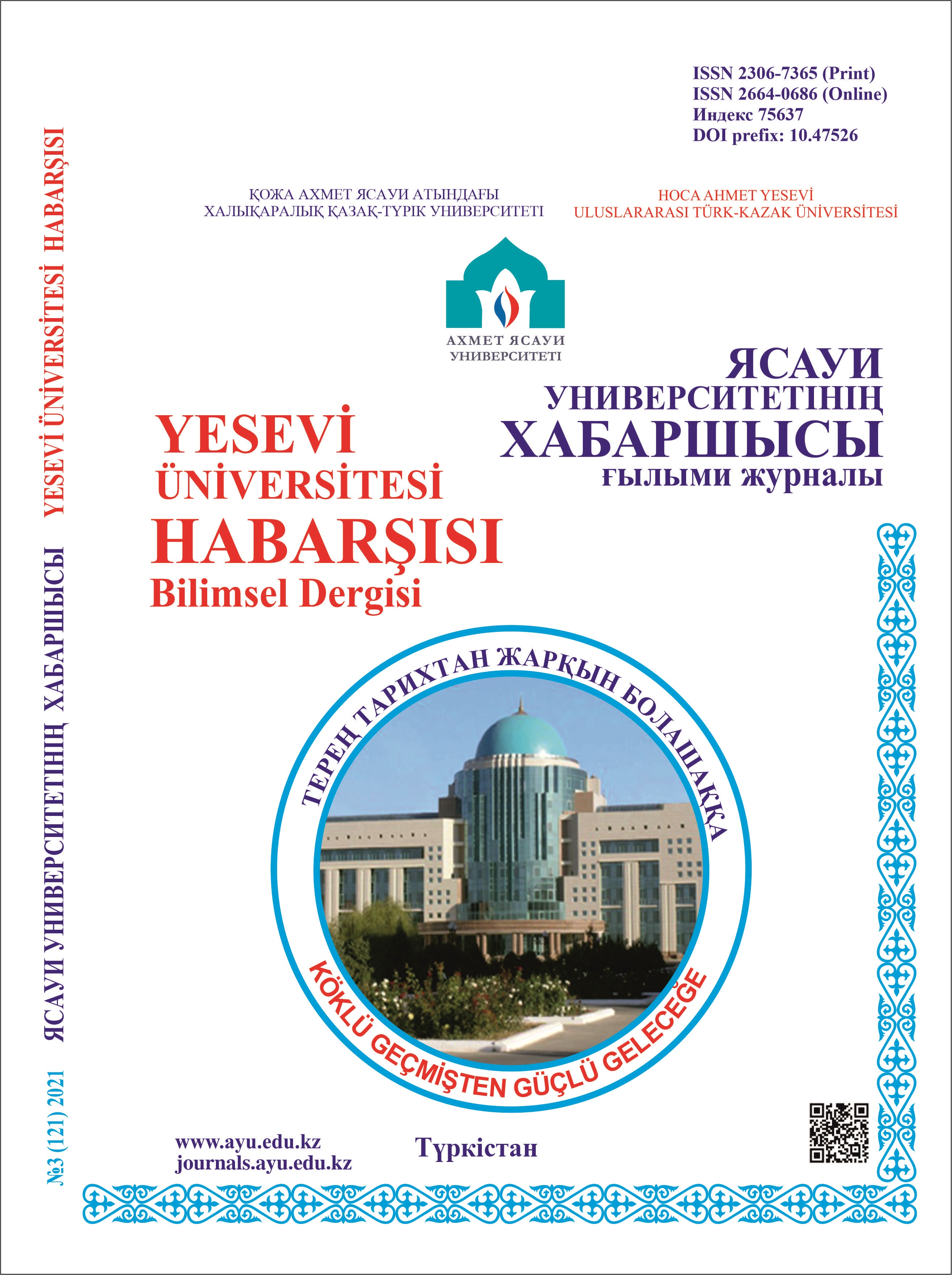Principles and Content of Teaching Future Computer Science Teachers to Develop and Use Open Educational Resources
204 120
Anahtar Kelimeler:
pedagogy, computer science teacherÖzet
The paper considers the principles and content of training future computer science teachers to develop and use open educational resources. Computer science plays an important role in education, so training qualified teachers in this area is becoming necessary. At the same time, currently, open educational resources are widely used at all levels of education. Open educational resources are available online materials that everyone can freely use. Future computer science teachers should have access to interactive textbooks, video lectures, online courses, etc., and they should familiarize themselves with the types of open resources and the principles of their development. Training future computer science teachers to develop and use open educational resources is based on several principles and includes several key aspects. During the research, the main criteria and principles of developing and using open educational resources were identified. The paper also considers the methods of using open educational resources in the educational process, the advantages and difficulties of using open educational resources, and provides recommendations for the effective use of such resources in the educational process. The research results may be used in the future in the process of training computer science teachers to develop and use open educational resources.
Referanslar
ПАЙДАЛАНЫЛҒАН ӘДЕБИЕТТЕР ТІЗІМІ
Кадирбаева Р.И., Бедебаева М.Е. Онлайн білім беру платформалары арқылы аралас оқыту технологиясын қолдану // Ясауи университетінің хабаршысы. – 2022. – №3 (125). – Б. 127–140. https://doi.org/10.47526/2022-3/2664-0686.11
Бисенгалиева А.М., Дюсегалиева К.О. ЖОО-да қашықтықтан оқытудың заманауи технологияларын меңгеру // Ясауи университетінің хабаршысы. – 2022. – №1 (123). – Б. 136–143. https://doi.org/10.47526/2022-1/2664-0686.12
Douglas A., Ismar Frango S. Quality assurance for open educational resources: The OER trust framework // International Journal of Learning, Teaching and Educational Research. – 2018. – №17 (3). – P. 1–14. https://doi.org/10.26803/ijlter.17.3.1 4. UNESCO. Accessible Open Educational Resources (OER): briefing paper. [Electronic resource]. URL: https://unesdoc.unesco.org/ark:/48223/pf0000380471.locale=en. – 2021. (date of access 26.05.2024)
https://ocw.mit.edu/ (қаралған күні 26.05.2024)
Osuna-Acedo S., Gil-Quintana J. The European project ECO. Breaking down barriers to access knowledge // Educacion XX1. – 2017. – №20 (2). – P. 189–213. https://doi.org/10.5944/educXX1.15852
Ayuso-Del Puerto D., Gutiérrez-Esteban P. Achieving Universal Digital Literacy through Universal Design for Learning in Open Educational Resources // Education as Change. – 2022. – №262 (8712). https://doi.org/10.25159/1947-9417/8712
Øystein R., Jeanette H.M., Moen A. Pedagogical Approaches and Learning Activities, Content, and Resources Used in the Design of Massive Open Online Courses (MOOCs) in the Health Sciences: Protocol for a Scoping Review // JMIR Research Protocols. – 2022. – №11 (51). https://doi.org/10.2196/35878
Ichimura Y., Suzuki K. Dimensions of MOOCs for Quality Design: Analysis and Synthesis of the Literature // International Journal for Educational Media and Technology. – 2017. – №1 (11). – P. 42–49.
Zawacki-Richter O., Müskens W., Marín V.I. Quality Assurance of Open Educational Resources // Handbook of Open, Distance and Digital Education. – 2023. – 1425 p. https://doi.org/10.1007/978-981-19-2080-6_43
Baas M., van der Rijst R., Huizinga T., van den Berg E., Admiraal W. Would you use them? A qualitative study on teachers' assessments of open educational resources in higher education // Internet and Higher Education. – 2022. – №54 (00857). https://doi.org/10.1016/j.iheduc.2022.100857
Rima S., Meriem H., Najima D., Rachida A. Systematic Literature Review on Open Educational Resources Recommender Systems // International Journal of Interactive Mobile Technologies. – 2022. – №16 (18). – P. 44–77. https://doi.org/10.3991/ijim.v16i18.32197 REFERENCES
Kadirbaeva R.I., Bedebaeva M.E. Onlain bіlіm beru platformalary arqyly aralas oqytu tehnologiiasyn qoldanu [Using Blended Learning Technologies through Online Educational Platforms] // Iasaui universitetіnіn habarshysy. – 2022. – №3 (125). – B. 127–140. https://doi.org/10.47526/2022-3/2664-0686.11 [in Kazakh]
Bisengalieva A.M., Duisegalieva K.O. JOO-da qashyqtyqtan oqytudyn zamanaui tehnologiialaryn mengeru [Mastering Modern Distance Learning Technologies at the University] // Iasaui universitetіnіn habarshysy. – 2022. – №1 (123). – B. 136–143. https://doi.org/10.47526/2022-1/2664-0686.12 [in Kazakh]
Douglas A., Ismar Frango S. Quality assurance for open educational resources: The OER trust framework // International Journal of Learning, Teaching and Educational Research. – 2018. – №17 (3). – P. 1–14. https://doi.org/10.26803/ijlter.17.3.1 4. UNESCO. Accessible Open Educational Resources (OER): briefing paper. [Electronic resource]. URL: https://unesdoc.unesco.org/ark:/48223/pf0000380471.locale=en. – 2021. (date of access 26.05.2024)
https://ocw.mit.edu/ (date of access 26.05.2023)
Osuna-Acedo S., Gil-Quintana J. The European project ECO. Breaking down barriers to access knowledge // Educacion XX1. – 2017. – №20 (2). – P. 189–213. https://doi.org/10.5944/educXX1.15852
Ayuso-Del Puerto D., Gutiérrez-Esteban P. Achieving Universal Digital Literacy through Universal Design for Learning in Open Educational Resources // Education as Change. – 2022. – №262 (8712). https://doi.org/10.25159/1947-9417/8712
Øystein R., Jeanette H.M., Moen A. Pedagogical Approaches and Learning Activities, Content, and Resources Used in the Design of Massive Open Online Courses (MOOCs) in the Health Sciences: Protocol for a Scoping Review // JMIR Research Protocols. – 2022. – №11 (51). https://doi.org/10.2196/35878
Ichimura Y., Suzuki K. Dimensions of MOOCs for Quality Design: Analysis and Synthesis of the Literature // International Journal for Educational Media and Technology. – 2017. – №1 (11). – P. 42–49.
Zawacki-Richter O., Müskens W., Marín V.I. Quality Assurance of Open Educational Resources // Handbook of Open, Distance and Digital Education. – 2023. – 1425 p. https://doi.org/10.1007/978-981-19-2080-6_43
Baas M., van der Rijst R., Huizinga T., van den Berg E., Admiraal W. Would you use them? A qualitative study on teachers' assessments of open educational resources in higher education // Internet and Higher Education. – 2022. – №54 (00857). https://doi.org/10.1016/j.iheduc.2022.100857
Rima S., Meriem H., Najima D., Rachida A. Systematic Literature Review on Open Educational Resources Recommender Systems // International Journal of Interactive Mobile Technologies. – 2022. – №16 (18). – P. 44–77. https://doi.org/10.3991/ijim.v16i18.32197

